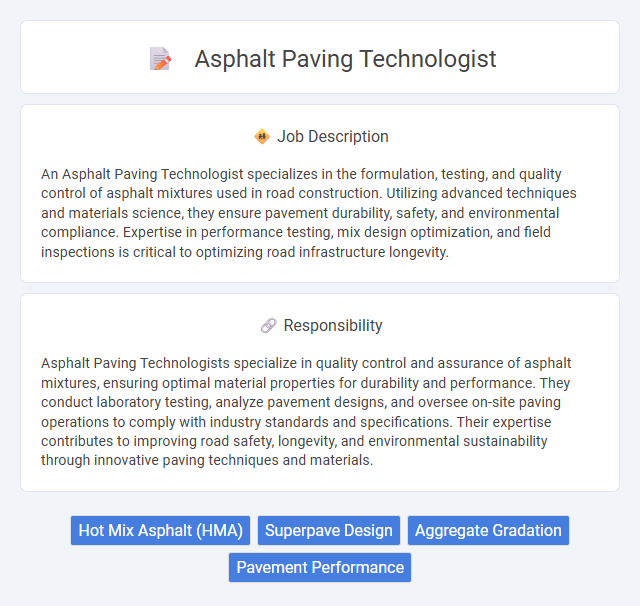
An Asphalt Paving Technologist specializes in the formulation, testing, and quality control of asphalt mixtures used in road construction. Utilizing advanced techniques and materials science, they ensure pavement durability, safety, and environmental compliance. Expertise in performance testing, mix design optimization, and field inspections is critical to optimizing road infrastructure longevity.
Individuals with a strong interest in construction and materials science are likely to find the role of an Asphalt Paving Technologist suitable, as it involves testing and ensuring the quality of paving materials. Candidates who possess good analytical skills, attention to detail, and physical stamina may be better suited for the demands of on-site inspections and laboratory testing. People with limited interest in technical processes or those who prefer less hands-on work might find this job less fitting.
Qualification
An Asphalt Paving Technologist requires a solid background in civil or materials engineering, often supported by a bachelor's degree focused on construction materials or pavement technology. Proficiency in laboratory testing methods, including mix design analysis, compaction techniques, and performance evaluation, is essential for ensuring optimal asphalt quality and durability. Certifications such as ACI (American Concrete Institute) or relevant state-level paving technology credentials enhance job qualification, highlighting expertise in modern asphalt paving standards and environmental compliance.
Responsibility
Asphalt Paving Technologists specialize in quality control and assurance of asphalt mixtures, ensuring optimal material properties for durability and performance. They conduct laboratory testing, analyze pavement designs, and oversee on-site paving operations to comply with industry standards and specifications. Their expertise contributes to improving road safety, longevity, and environmental sustainability through innovative paving techniques and materials.
Benefit
An Asphalt Paving Technologist likely enhances project efficiency by ensuring the appropriate mix design and application techniques, reducing material waste and rework costs. Their expertise may improve pavement durability, leading to longer-lasting roads and fewer maintenance expenses. Employing such a specialist could boost safety standards and compliance with environmental regulations, potentially minimizing legal risks and fostering community trust.
Challenge
The Asphalt Paving Technologist faces the challenge of ensuring optimal pavement quality while adapting to varying environmental conditions and material properties. They must likely balance cost-efficiency with durability by selecting and testing appropriate asphalt mixtures under strict industry standards. Managing project timelines amid unforeseen variables such as weather or material inconsistencies probably requires advanced problem-solving and technical expertise.
Career Advancement
Asphalt Paving Technologists specialize in improving pavement materials and construction techniques, advancing through roles like Senior Technologist, Project Manager, or Quality Control Supervisor. Mastery of materials science and project management accelerates career growth, often leading to leadership positions in infrastructure development firms. Continuous learning in sustainable paving technologies enhances job prospects within the expanding road construction industry.
Key Terms
Hot Mix Asphalt (HMA)
Hot Mix Asphalt (HMA) plays a central role in the responsibilities of an Asphalt Paving Technologist, who specializes in the design, testing, and quality control of asphalt mixtures used in road construction. This professional applies advanced knowledge of HMA composition and temperature management to optimize pavement performance and durability. Expertise in HMA ensures improved resistance to deformation, cracking, and weather-related damage, supporting infrastructure longevity and safety.
Superpave Design
An Asphalt Paving Technologist specializing in Superpave Design develops optimized asphalt mixtures tailored to specific traffic loads and environmental conditions, ensuring enhanced pavement durability and performance. Mastery of Superpave Mix Design involves evaluating aggregate properties, selecting binder grades, and conducting performance tests to meet stringent quality standards. This role requires proficiency in interpreting material data, applying state DOT specifications, and utilizing advanced software tools for mixture analysis and pavement performance prediction.
Aggregate Gradation
Asphalt Paving Technologists specialize in optimizing aggregate gradation to ensure pavement durability and performance standards are met. Precise control of aggregate size distribution directly impacts asphalt mix stability, resistance to rutting, and overall ride quality. Advanced knowledge in aggregate gradation testing methods, such as sieve analysis and particle shape assessment, is essential for developing high-quality asphalt mixtures.
Pavement Performance
Asphalt Paving Technologists specialize in analyzing and improving pavement performance by selecting optimal asphalt mixtures and refining construction techniques. They utilize advanced testing methods and performance models to predict durability, resistance to cracking, rutting, and moisture damage. Their expertise directly enhances the lifespan and safety of roadways, reducing maintenance costs and environmental impact.
 kuljobs.com
kuljobs.com